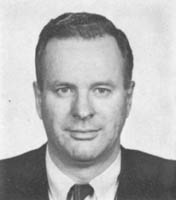John Wilkins
- 1967

Fellowship Title:
- Contemporary German Society
Fellowship Year:
- 1967
Squeezing The Social Democrats
Bonn November 13, 1967 Mr. Wilkins is an Alicia Patterson Fund award winner, on leave from The Tacoma News Tribune. Permission to publish this article may be sought from The Managing Editor, The Tacoma News Tribune, Tacoma, Washington. The vote was 441 for, 84 against. Those opposed were all Social Democrats. Standing against the new chancellor’s request for special powers for his cabinet, they were casting a long shadow. They stood for the political conscience of Germany that day in March of 1933. It was just about the last time that anyone said “no” to Hitler in the Reichstag. Many of those Social Democrats were soon to follow others of their party in flight or imprisonment. Some were soon to die. Some were to continue saying “no” but only inwardly. True, some conservatives were to meet the same fates, and the Communists already had been bloodily smashed, but generally the conservatives had leaned to accommodation, and the Communists at some crucial moments had been more intent on weakening the Social Democrats than on stemming
Old Lands and New Germans
BONN OCTOBER 20, 1967 Mr. Wilkins is an Alicia Patterson Fund award winner, on leave from The Tacoma News Tribune. Permission to publish this article may be sought from The Managing Editor, The Tacoma News Tribune, Tacoma, Washington. “I cling to Silesia… as… a child to a mother.” Herbert Schwarzer, executive secretary of the Federation of Expelled Germans, spoke to me thus emotionally only after a long matter-of-fact interview had run out of gas. Refueled with coffee, the conversation had continued into areas of his personal feeling and conjecture. No longer was he speaking as full-time director of an association representing 10.6 million German-speaking people in West Germany (about 18 per cent of its population) who had fled or been expelled from territories east of the Oder and Neisse rivers or from other areas in Central and Eastern Europe. (The figure includes children of fathers who had come from those areas.) Now be was speaking as one of them. Schwarzer looks 15 years younger than his 60 years. He is blond, blue-eyed, compactly small,
Making The Scene in Germany
RemagenFederal German Republic September 21, 1967 Mr. Wilkins is an Alicia Patterson Fund award winner, on leave from The Tacoma News Tribune. Permission to publish this article may be sought from The Managing Editor, The Tacoma News Tribune, Tacoma, Washington. All The Best We all “graduated” from our intensive on-the-scene German language course at the end of July, but I recall some of them with a nostalgia of almost the same hue as that surrounding school friends of more than a quarter-century ago. Recentness only sharpens the poignancy. I keep wondering if — after her late-July letter to The States requesting a deferment of her psychology fellowship — the pretty and competent but reassuringly vulnerable girl of 22 from the Southwest was able to land a job of some kind here in Germany for a year, beginning in September. I wonder how the stubbornly patriotic 26-year-old doctoral candidate in international relations will make out when they test his German fluency at his American university this fall, and if he will win interest in the
The Time Machines
Remagen Federal German Republic August 18, 1967 Mr. Wilkins is the 1967 Alicia Patterson Fund award winner, on leave from The Tacoma News Tribune. Permission to publish this article may be sought from The Managing Editor, The Tacoma News Tribune, Tacoma, Washington. 1. The Tape There were four of us on the von Hodenberg terrace, shaded by linden and oak trees. The austere, manorial house is still the largest home in the Lower Saxony village of Barum bei Uelzen and still the heart of a substantial farm — but 20 miles to the east is the border with East Germany. Over there in Mecklenburg, the von Hodenbergs once had additional farmlands. No longer, of course. **Von Hodenberg Home Near Uelzen. The four of us were staring at a tape recorder and listening as the spools inexorably rotated. The date was July 31, 1967. The tape had been made and sent to me six months earlier, but it told a story that began in 1935. The tape was stitching a part of Germany’s past to the
The Grand Coalition
Luneburg Federal German Republic July 19, 1967 Mr. Wilkins is the 1967 Alicia Patterson Fund award winner, on leave from The Tacoma News Tribune. Permission to publish this article may be sought from The Managing Editor, The Tacoma News Tribune, Tacoma, Washington. Led by men of purpose and prestige, West Germany gets off the dime but interrogates itself about democracy. “…This question we ask ourselves every morning,” replied the political editor of a large, prestigious daily newspaper in the Bundesrepublik. He spoke almost with a sigh. My final question had emerged as the obvious one to ask, following his open but studied and lengthy responses to all my queries about German problems and politics. Central to most of his answers had been an assessment of the coalition government’s guidance of the nation onto a new course. Then had come my question, the one that torments many thinking Germans in this period of seachange: “How long should the coalition last?” This was different from asking how long it will last. The latter question is less
